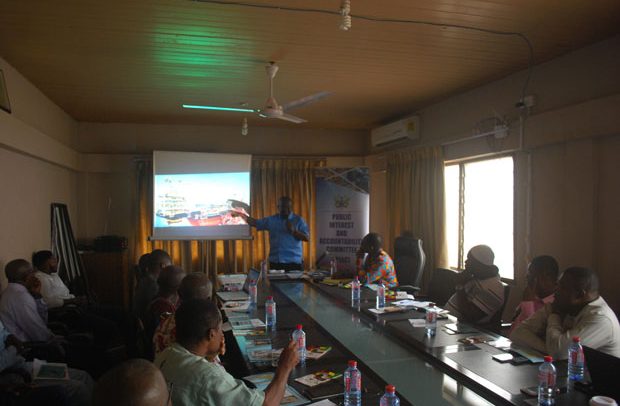Mr Jantuah during the forum
Kwame Jantuah, Vice Chairman of the Public Interest Accountability Committee (PIAC), has indicated that Ghana’s petroleum revenue has been used to address many problems in the country simultaneously instead of investing in the four priority areas.
The priority areas set out by law, Mr Jantuah said, are agriculture mechanization, road and other infrastructure, amortization and capacity-building.
This, according to him, has no doubt weakened the potential impact of oil revenues on the socio-economic development of Ghana.
At a public forum on the management of Petroleum Revenue held for the Adentan Municipal Assembly (AdMa) in the Greater Accra lately, he disclosed that revenue, which accrued from the over 194,095,809 barrels of crude oil production from 2011 to 2016, was spent on items outside the priority areas.
The Vice Chairman added that only 11 percent of petroleum revenue from 2011 to 2016 had been allocated to agriculture, which is the mainstay of the country.
“If this trend continues without proper checks, the country is likely to end up with nothing tangible as evidence for its petroleum revenue,” he remarked.
PIAC has always made its position on petroleum revenue very clear to government through its annual and semiannual reports.
He said PIAC was of the belief that few legacy projects should be identified and supported by Annual Budget Funding Amount (ABFA)
While commending the government for redefining the management of oil and gas, he reiterated that it was equally important to put adequate measures in place to protect the industry from being taken over by foreign cartels.
The future of oil business is uncertain due to its volatile nature and it is for such and other reasons that government must put measures in place to revamp the other sectors of national economy, according to him.
Mr Jantuah appealed to government to refine crude oil to keep the country in business in the wake of low world market prices.
PIAC, which was established in September 2011, has the mandate to monitor and evaluate the management of Ghana’s petroleum revenue.
By Solomon Ofori


